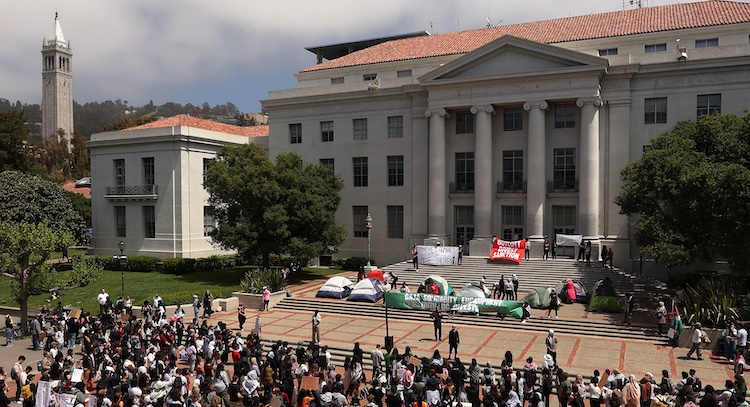The porousness of the border between anti-Israel policy and ant-Semitic bigotry is on full display in the case of Yael Nativ. The whole affair also illustrates how comfortable Western society has gotten with overt discrimination against Jews.
In 2023, Nativ went public with an incident that led to the lawsuit she filed last week in California. Writing in Haaretz two years ago, Nativ explained that she was a visiting lecturer in contemporary dance at the University of California, Berkeley, in 2022. Nativ is Israeli, and her class examined “contemporary dance in Israel, in social and political contexts.”
The class was a hit, and Nativ was encouraged to come back. On the advice of the department, Nativ applied in the summer of 2023 for a teaching slot in 2024. And then, three weeks after the Hamas attacks of Oct. 7, 2023, she received an apologetic note from her friend and colleague at the head of the Berkeley Department of Theater, Dance, and Performance Studies:
“My dept cannot host you for a class next fall.… Things are very hot right now and many of our grad students are angry. I would be putting the dept and you in a terrible position if you taught here.” The text also mentioned “in general, everything that’s happening on campus.”
In other words, the students really don’t want any Israelis around. Nativ is Israeli, and for that reason, it was all but said, she would not be welcome back at the university at this time.
About a month later, Nativ wrote her op-ed for Haaretz. It caught the attention of concerned alumni, who raised objections with the chancellor’s office in regard to Nativ’s treatment. That, in turn, ignited an internal investigation which concluded that the claim that Nativ was discriminated against based on her national origin “was substantiated by a preponderance of the evidence and constituted a violation of Berkeley’s Nondiscrimination Policy.”
The school’s nondiscrimination policy echoes the protections in Title VI of the Civil Rights Act, which has been at the center of the Trump administration’s battles with a number of major universities. The administration has argued, convincingly, that several schools are in noncompliance with civil-rights law and therefore are ineligible to retain their federal funding until they can show they are protecting the civil rights of Jewish students.
In a case like Nativ’s, there isn’t much room for interpretation. The university policy prohibits discrimination on the basis of, for example, “national origin.” This is why the rampant anti-Zionism across academia is such a legal problem: The claim that someone can be “anti-Israel without being anti-Semitic” becomes irrelevant. Anti-Israel discrimination is national origin discrimination. The rest is noise.
But the Nativ case also shows why the distinction between anti-Israel prejudice and anti-Semitism is so hard to make. Ask yourself the following question: If Yael Nativ had been an Arab Israeli—which the university and activist worlds increasingly and imprecisely call Palestinian—would she have received the same note? To ask the question is to answer it.
So the problem, very clearly, is not that Nativ is from Israel. It’s that she’s a Jew from Israel.
Interestingly, in her original Haaretz op-ed Nativ made the following observation about her students:
“The diligent students read, listened attentively and did everything they were asked to do, except for one thing — speaking and engaging in classroom discussions. They were silent. A lot. Even when I explicitly asked them to speak or asked a specific question, they reacted with great discomfort.”
So Nativ asked a colleague what the Berkeley students were so afraid of. The colleague responded: “That they won’t say the right thing, that they won’t give the exact answer. That they’ll offend you or somebody in the class, that they’ll be subjected to online shaming or will be canceled on social media. They prefer to stay silent and get through the lesson that way.”
I’m skeptical that’s the full explanation. In case after case, students have been unafraid to insult the Israelis in their midst so long as their professor shared their prejudices. (In plenty of cases it was a professor who initiated an anti-Israel pile-on during class.) The students in Nativ’s class weren’t afraid to offend a Jew or an Israeli; they were fearful of speaking their mind because—at least in some cases, we can presume—all they had to say consisted of ad hominem accusations and personal insults.
The truth is, they had nothing worth saying, so they (somewhat miraculously) managed to say nothing. That may have seemed troubling to a visiting professor but unfortunately, in academia, it’s fast becoming the best-case scenario.

















